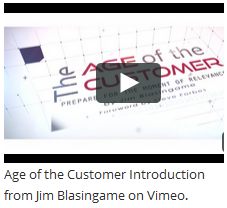 Consider the ancient proverb: “Any chain is only as strong as its weakest link.” This is about four letters with this proverb in mind, sent to small businesses from their corporate customers – two that have been sent and two that will be.
Consider the ancient proverb: “Any chain is only as strong as its weakest link.” This is about four letters with this proverb in mind, sent to small businesses from their corporate customers – two that have been sent and two that will be.
1. Quality
The first letter was born in the 1950s, when the ideas of the godfather of the 20th century quality process, Edwards Deming, reversed “Made in Japan” from a metaphor for cheap into a mark of quality. During the 1980s, after American industrial competitiveness fell behind global competitors, quality processes like ISO and Six Sigma were adopted, returning “Made in America” to a mark of excellence.
By 1990, with their in-house quality act now together, big businesses realized they needed similar commitments from the small business vendors that had increasingly become more like integrated partners. As such, big business needed to know that the support from these partners would at least not diminish the quality expectations of their customers. Consequently, small businesses started receiving letters from those big customers requesting evidence of quality process practices, if not certification, without which there would be no continued, or new contracts.
2. Y2K
The seed for the second letter was planted by computer programmers in the 1960s. When these programmers wrote date codes with six digits, as in 121565, for December 15, 1965, they did so to conserve what was at the time very expensive data storage. However, they didn’t realize they were creating the literally ticking Y2K time bomb.
Around 1995, experts started worrying that when the clock ticked midnight, January 1, 2000, zillions of lines of date-sensitive computer calculations would fail by going back a century – 010100 would revert to January 1, 1900 – instead of rolling forward to 2000. Consequently, the codes in millions of programs had to be fixed. By 1998, small businesses started getting letters from their larger customers requesting evidence of their “Y2K compliance,” without which there would be no new contracts with eight-digit dates.
3. Sustainability
The third letter was born in the middle of the 20th century, when we started realizing that the solution to pollution was not dilution. Since then, environmental stewardship has evolved from not polluting to sustainability. That word – sustainability – essentially means doing more with less, and it includes making waste useful – especially water. It turns out that sustainability is not just the right thing to do. Since it’s been proven that it can also contribute to profitability and a positive corporate image, it’s become a 21st century business best practice.
You may not yet have received a sustainability commitment and practices letter from your corporate customers, but it’s coming. And because of that best practice thing, it will be irrespective of the current state of the geo-political climate change debate. So start thinking about resources usage, including energy, consumables, production waste – especially water. Start documenting your efforts, practices and performance in recycling, reusing, conserving, etc., so when a customer hands you their “Sustainability Letter,” you won’t have that “weak-link in the headlights” look.
4. Cyber-security
Does anyone need a review of the multiple and significant cyber-assaults that have been made on digital assets and records of American business and government in the past few years? Whether from cyber-criminals or cyber-spies, the threat is real, comprehensive, determined, unrelenting and, to date at least, very successful – for the bad guys.
Expect the Trump administration to push for increased cyber-defense measures for the government to an unprecedented degree. Because of the massive level of business that corporate America does with the federal government, a cyber-security partnership will logically be forged, as they collaborate on cyber-practices, expectations, tools, innovations, etc. This will be the most comprehensive commingling of efforts and shared goals by business and government since WWII. So expect your large customers to begin requiring cyber-security practices verification, either by a letter, or in the specifications of an RFP. Your corporate customers are not going to let you be their weak link.
Write this on a rock … Take a lesson from the Quality and Y2K letters. Set yourself up for success by taking action on sustainability and cyber-security. Do it now!




